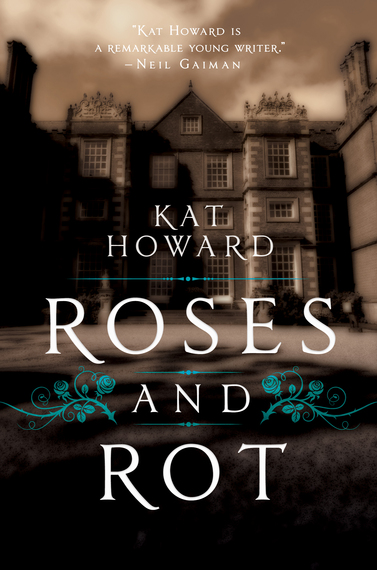Art, fairy tales, and folklore take center stage in Kat Howard's enchanting debut fantasy, Roses and Rot. The protagonist, Imogen, is a writer who is accepted to a prestigious--and mysterious--artist's colony that has a way of making people's fortunes. Her sister, a dancer, joins her there too. The world Howard creates is glittering, intricately crafted, and unexpectedly dark. Bonds of family, the drive to create, and the relationship of that drive to coping with traumas are some of the themes explored.
I've been anticipating this novel since I heard about it, as a fan of fairy tales and stories that examine the impulse to create. In this interview Kat talks about her inspirations, her journey to becoming a writer, and more.
I'm intrigued by your journey to becoming a writer. My impression is that you've worn many hats, and come through several life transitions to reach this point. Is that right?
It is. I was never one of those people who knew from a young age that they wanted to be a writer. I loved to write, but it took a while for it to seem like something that was possible for me. So I went to law school, and taught law for a bit, and got a PhD in medieval literature, and then - when I was almost finished with that, my personal life sort of imploded. And I basically thought, well, I might as well try this thing - everything else has gone wrong, so what do I have to lose? So I applied to the Clarion Writers Workshop, and realized while I was there that I was a writer.
Having come through so many ordeals to become a writer, does the theme of Roses and Rot about great art coming at a price have particular resonance for you?
I'm not sure if I would say I came through ordeals - I honestly feel like I've been very lucky, in that once I decided that I was going to seriously pursue writing, my family and friends have been incredibly supportive of me. And the idea of art coming with a price - I think anyone who has seriously pursued art of any kind is familiar with making sacrifices in that pursuit. I just sort of took that idea and pushed it as far as I could.
Roses and Rot is a beautifully written book, and there is something especially transcendent about the passages that describe dance. What is your relationship with the dance world?
Oh, thank you so much for saying that. I was actually very nervous about those passages, because I'm not a dancer. I love dance - it's one of my favorite art forms, and one of my very dear friends, Megan Kurashige, is a professional dancer (as well as a talented writer.) I'd been fortunate enough to collaborate with the company that she and her sister Shannon founded, Sharp & Fine, on a piece called A Thousand Natural Shocks, in 2012, and I learned a tremendous amount during that process. Megan also gave me a lot of insight into a dancer's life, and so what I got right came out of discussions with her.
One of my favorite elements of Roses and Rot is the way it is fairly dripping with fairy tale references, and is itself very much a fairy tale. Can you talk about that aspect of the book?
Well, while "Tam Lin" is originally a ballad, it's always felt like a fairy tale in my head, and the elements I was interested in playing with for the sake of this book (which I'm being cagey about, for the sake of avoiding spoilers) were the ones that had the most fairy tale feel to me. So it made sense in my head to situate the story I wanted to tell in that tradition, and to pull on the thematic resonance that the fairy tale elements offered.
What do you think influenced your decision to make this take on the ballad of Tam Lin so subversive, so dark?
Some of it came out of the original ballad - a couple of places that I had wanted to make work in my version of it but couldn't. For example, Faerie having to pay a tithe to Hell every seven years, or the line where the Faerie Queen tells Thomas that if she'd known he was going to leave her, she would have taken out his heart of flesh, and replaced it with a heart of stone. I mean! It's great.
But also, to go back to an earlier question of yours, I did want to bring in the theme of sacrifice. That was in the story from the beginning, and I wanted the idea there to be stark enough to mean something - I wanted the choices that got made in the book to hurt.
You are clearly someone incredibly well-read. What can you recommend to readers who loved Roses and Rot, if they want to pursue some background texts?
The first thing that I would recommend to anyone is Pamela Dean's beautiful novel, Tam Lin. It was where I discovered the story, and it's one of my favorite books. I name-check Maria Tatar at one point in Roses and Rot, and really, if you like fairy tales, you should absolutely check out her work. Ellen Datlow and Terri Windling have edited many excellent anthologies of retold fairy tales - it would be impossible for me to pick a favorite. I also mention the Thomas the Rhymer story briefly, and Ellen Kushner wrote a novel - Thomas the Rhymer - which is as smart and elegant as all her work.
What's next for you?
You can usually find me writing short fiction of one sort or another, and I'll be spending this summer putting the finishing touches on my short fiction collection, A Cathedral of Myth and Bone, which will be out in early 2018. I'll also be editing my next novel, which will be out in late 2017.

Kat Howard lives in New Hampshire. Her short fiction has been nominated for the World Fantasy Award, anthologized in year's best and best of collections, and performed on NPR. Roses and Rot is her debut novel. You can find her on twitter at @KatWithSword.
*
Ilana Teitelbaum's writing has appeared in the Globe and Mail, the Los Angeles Review of Books, and Salon. Her epic fantasy debut, Last Song Before Night, was published in October 2015 by Tor/Macmillan under the pen name Ilana C. Myer.

